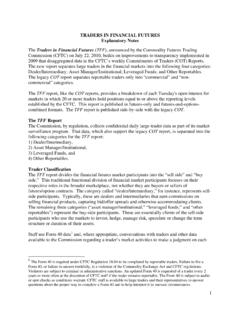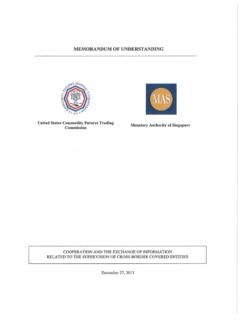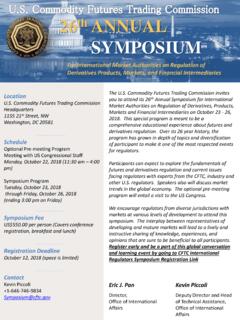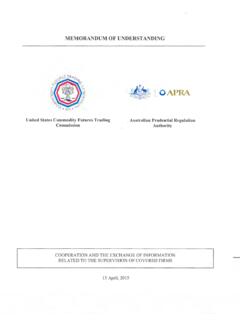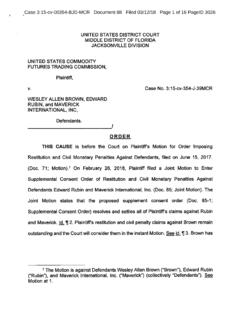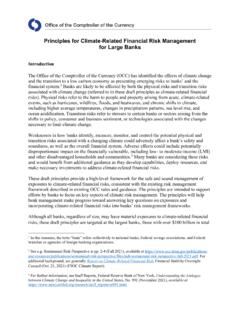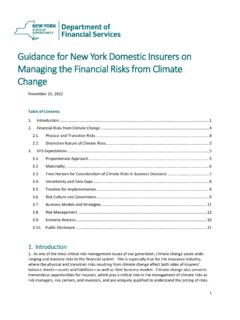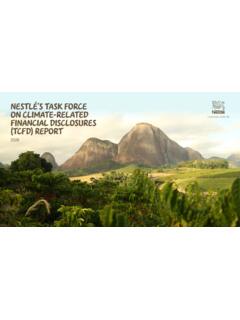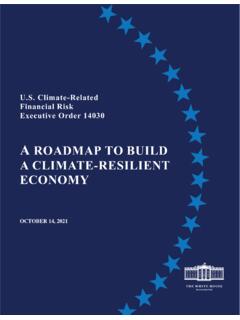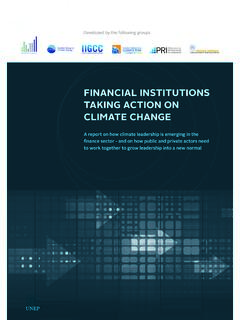Transcription of Managing Climate Risk in the U.S. Financial System
1 Managing Climate RISK IN THE Financial SYSTEMR eport of the Climate -Related Market Risk Subcommittee, Market Risk Advisory Committee of Commodity Futures Trading CommissionCommissioner Rostin Behnam, SponsorBob Litterman, ChairmanLibrary of Congress Control Number: 2020915930 ISBN: 978-0-578-74841-2 This report is approved by the Subcommittee on Climate -Related Market Risk of the Market Risk Advisory Committee (MRAC). The views, analyses, and conclusions expressed herein reflect the work of the Subcommittee on Climate -Related Market Risk of the MRAC, and do not necessarily reflect the views of the MRAC, the Commodity Futures Trading Commission or its staff, or the Government. Reference to any products, services, websites, organizations, or enterprises, or the use of any organization, trade, firm, or corporation name is for informational purposes only and does not constitute endorsement, recommendation, or favoring by the view individual subcommittee members concurring statements, if any, please see Climate RISK IN THE Financial SYSTEMR eport of the Climate -Related Market Risk Subcommittee, Market Risk Advisory Committee of Commodity Futures Trading CommissionCommissioner Rostin Behnam, SponsorDavid Gillers, Chief of Staff, Office of Commissioner BehnamBob Litterman, ChairmanLeonardo Martinez-Diaz, EditorJesse M.
2 Keenan, EditorStephen Moch, Associate EditorExecutive Summary ..iList of Tables and Figures ..xiList of Acronyms and Abbreviations ..xiiiForeword ..xviiChapter 1: Introduction to Finance in the Face of Climate Change ..1 Chapter 2: Physical and Transition Risks in the Context of the United States ..11 Chapter 3: Implications of Climate Change for the Financial System .. 25 Chapter 4: Existing Authorities and Recommendations for Financial Regulators ..41 Chapter 5: A Closer Look at Climate Risk Management and Data ..55 Chapter 6: A Closer Look at Climate Scenarios ..73 Chapter 7: A Closer Look at Climate Risk Disclosure.. 87 Chapter 8: A Closer Look at Financing the Net-Zero Transition ..103 Conclusion ..119 List of Recommendations ..123 References ..137 Appendix ..159 Members of the Climate -Related Market Risk Subcommittee.. 163 Table of ContentsClimate change poses a major risk to the stability of the Financial System and to its ability to sustain the American economy.
3 Climate change is already impacting or is anticipated to impact nearly every facet of the economy, including infrastructure, agriculture, residential and commercial property, as well as human health and labor productivity. Over time, if significant action is not taken to check rising global average temperatures, Climate change impacts could impair the productive capacity of the economy and undermine its ability to generate employment, income, and opportunity. Even under optimistic emissions-reduction scenarios, the United States, along with countries around the world, will have to continue to cope with some measure of Climate change-related reality poses complex risks for the Financial System . Risks include disorderly price adjustments in various asset classes, with possible spillovers into different parts of the Financial System , as well as potential disruption of the proper functioning of Financial markets.
4 In addition, the process of combating Climate change itself which demands a large-scale transition to a net-zero emissions economy will pose risks to the Financial System if markets and market participants prove unable to adapt to rapid changes in policy, technology, and consumer preferences. Financial System stress, in turn, may further exacerbate disruptions in economic activity, for example, by limiting the availability of credit or reducing access to certain Financial products, such as hedging instruments and major concern for regulators is what we don t know. While understanding about particular kinds of Climate risk is advancing quickly, understanding about how different types of Climate risk could interact remains in an incipient stage. Physical and transition risks may well unfold in parallel, compounding the challenge. Climate risks may also exacerbate Financial System vulnerabilities that have little to do with Climate change, such as historically high levels of corporate leverage.
5 This is particularly concerning in the short- and medium-term, as the COVID 19 pandemic is likely to leave behind stressed balance sheets, strained government budgets, and depleted household wealth, which, taken together, undermine the resilience of the Financial System to future SUMMARYE xecutive SummaryThe central message of this report is that Financial regulators must recognize that Climate change poses serious emerging risks to the Financial System , and they should move urgently and decisively to measure, understand, and address these risks. Achieving this goal calls for strengthening regulators capabilities, expertise, and data and tools to better monitor, analyze, and quantify Climate risks. It calls for working closely with the private sector to ensure that Financial institutions and market participants do the same. And it calls for policy and regulatory choices that are flexible, open-ended, and adaptable to new information about Climate change and its risks, based on close and iterative dialogue with the private sector.
6 At the same time, the Financial community should not simply be reactive it should provide solutions. Regulators should recognize that the Financial System can itself be a catalyst for investments that accelerate economic resilience and the transition to a net-zero emissions economy. Financial innovations, in the form of new Financial products, services, and technologies, can help the economy better manage Climate risk and help channel more capital into technologies essential for the transition. Findings of the Report This report begins with a fundamental finding Financial markets will only be able to channel resources efficiently to activities that reduce greenhouse gas emissions if an economy-wide price on carbon is in place at a level that reflects the true social cost of those emissions. Addressing Climate change will require policy frameworks that incentivize the fair and effective reduction of greenhouse gas emissions.
7 In the absence of such a price, Financial markets will operate suboptimally, and capital will continue to flow in the wrong direction, rather than toward accelerating the transition to a net-zero emissions economy. At the same time, policymakers must be sensitive to the distributional impacts of carbon pricing and other policies and ensure that the burden does not fall on low-to-moderate income households and on historically marginalized communities. This report recognizes that pricing carbon is beyond the remit of Financial regulators; it is the job of Congress. A central finding of this report is that Climate change could pose systemic risks to the Financial System . Climate change is expected to affect multiple sectors, geographies, and assets in the United States, sometimes simultaneously and within a relatively short timeframe. As mentioned earlier, transition and physical risks as well as Climate and non- Climate -related risks could interact with each other, amplifying shocks and stresses.
8 This raises the prospect of spillovers that could disrupt multiple parts of the Financial System simultaneously. In addition, systemic shocks are more likely in an environment in which Financial assets do not fully reflect Climate -related physical and transition risks. A sudden revision of market perceptions about Climate risk could lead to a disorderly repricing of assets, which could in turn have cascading effects on portfolios and balance sheets and therefore systemic implications for Financial Climate RISK IN THE Financial SYSTEMiiAt the same time, this report finds that regulators should also be concerned about the risk of Climate -related sub-systemic shocks. Sub-systemic shocks are defined in this report as those that affect Financial markets or institutions in a particular sector, asset class, or region of the country, but without threatening the stability of the Financial System as a whole.
9 This is especially relevant for the United States, given the country s size and its Financial System , which includes thousands of Financial institutions, many regulated at the state level. Sub-systemic shocks related to Climate change can undermine the Financial health of community banks, agricultural banks, or local insurance markets, leaving small businesses, farmers, and households without access to critical Financial services. This is particularly damaging in areas that are already underserved by the Financial System , which includes low-to-moderate income communities and historically marginalized communities. The report finds that, in general, existing legislation already provides Financial regulators with wide-ranging and flexible authorities that could be used to start addressing Financial Climate -related risk now. This is true across four areas oversight of systemic Financial risk, risk management of particular markets and Financial institutions, disclosure and investor protection, and the safeguarding of Financial sector utilities.
10 Presently, however, these authorities and tools are not being fully utilized to effectively monitor and manage Climate risk. Further rulemaking, and in some cases legislation, may be necessary to ensure a coordinated national response. While some early adopters have moved faster than others in recent years, regulators and market participants around the world are generally in the early stages of under-standing and experimenting with how best to monitor and manage Climate risk. Given the considerable complexities and data challenges involved, this report points to the need for regulators and market participants to adopt pragmatic approaches that stress continual monitoring, experimentation, learning, and global coordination. Regulatory approaches in this area are evolving and should remain open to refinement, especially as understanding of Climate risk continues to advance and new data and tools become available.
